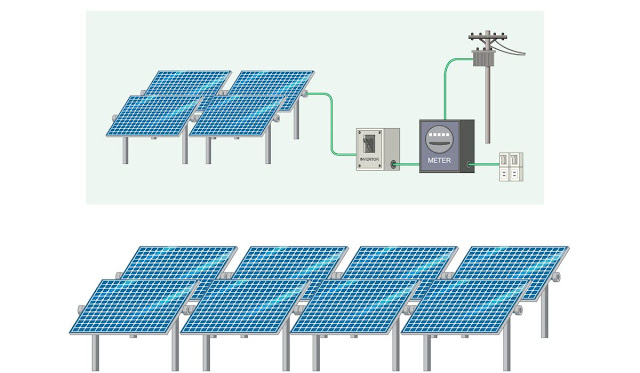What is on-grid solar panel?
On-grid solar panels are
connected to the electric grid and feed any excess electricity generated by the
panels back into the grid. This allows the homeowner to receive credits on
their utility bill for the excess energy, and to draw power from the grid when
their solar panels are not producing enough energy to meet their needs. On-grid solar systems do not require battery storage as excess energy is fed back to
the grid.
Best way to use on-grid solar
panels?
The best way to use on-grid solar
panels depends on the specific situation, but here are a few general tips that
can help:
- Maximize sunlight exposure: Make sure the solar panels are installed in a location that receives maximum sunlight throughout the day. This will help to generate more electricity and save more money on your utility bill.
- Use energy-efficient appliances: By using energy-efficient appliances, you can reduce your overall energy consumption and rely more on the electricity generated by your solar panels.
- Optimize the size of the system: The size of your solar panel system should be optimized to match your energy consumption. A system that is too small will not provide sufficient energy, while a system that is too large will result in wasted energy and money.
- Monitor your energy consumption: Regularly monitoring your energy consumption will help you identify patterns and make adjustments to your energy usage habits.
- Consider time-of-use rate plan: Many utility companies offer time-of-use rate plans, which can help you save money by using more energy during off-peak hours when solar panels are generating the most energy.
- Regular Maintenance: Regular maintenance of the solar panel system ensures the panels are functioning optimally, cleaning the panels and checking the wiring is important.
Conclusion
In conclusion, on-grid solar panels are a great option for homeowners looking to reduce their electricity costs and make use of renewable energy. By connecting to the electric grid, these systems allow homeowners to feed excess energy back into the grid and receive credits on their utility bills. To get the most out of an on-grid solar panel system, it's important to maximize sunlight exposure, use energy-efficient appliances, optimize the size of the system, monitor energy consumption, and consider time-of-use rate plans. Regular maintenance is also important to ensure the system continues to function optimally. On-grid solar systems are a great way to reduce carbon footprint and save on electricity cost, it also helps in reducing dependency on non-renewable resources.



Comments
Post a Comment